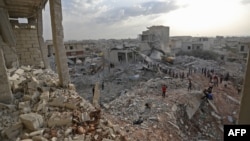The United Nations reports Syria remains the world's largest humanitarian crisis as killings, displacement, hunger and illness threaten the lives of more than 13 million people dependent upon international life-saving aid in this war-torn country.
According to the U.N., nearly one million people were newly-displaced in Syria between January and April, making this the highest number of people forced to flee their homes in a short period of time since the war began seven years ago.
Since last year, the number of people in hard-to-reach and besieged areas has dropped from 4.5 million to two million. Nevertheless, the United Nations says delivering humanitarian aid remains difficult. It blames this on ongoing conflict, bureaucratic red tape, and the refusal of the Syrian government to allow most U.N. convoys into these areas.
U.N. Regional Humanitarian Coordinator for the Syria Crisis Panos Moumtzis said the humanitarian operation is suffering from a huge funding shortage. He says only 27 percent of the $3.4 billion U.N. appeal has been received.
"With the low level of funding, the high acute level of emergency, the massive displacement, including evacuations that have taken place, the humanitarian response on the ground is really at a breaking point," he said. "We are stretched to the maximum. We are literally from hand to mouth, emptying warehouses, working around the clock."
Moumtzis said the United Nations is worried about a new escalation in fighting in the northern governorate of Idlib.
He told VOA 2.5 million civilians are living in Idlib under very harsh, congested conditions. He said there is no military solution to this explosive situation.
"The fact that civilians have been displaced there for quite some time, there has to be a negotiated way forward," he added. "There has to be a peaceful solution that avoids the bloodshed we saw in other areas, a peaceful solution that avoids more displacement taking place because there is nowhere else to go."
Moumtzis said the United Nations has drawn up contingency plans so humanitarian workers can respond quickly to the needs of the displaced should fighting intensify in Idlib. He said he hopes this will not be necessary.




